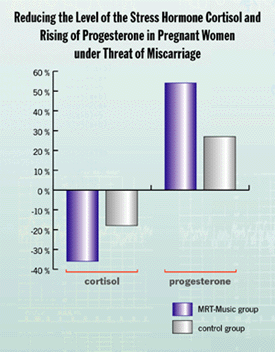We build two groups, an experimental group and a control group. In the first two days all patients of both groups underwent complex hormonal investigations, in which the blood levels of cortisol, progesterone and estradiol as well as the kariopiknotic hormone index were determined.
On average the patients were 23 years old (±3,1). For seven of the women it was their first pregnancy, eight were pregnant for the second time.
Medical Resonance Therapy Music®
Group
For 8-10 days 15 patients received every day for 30-60 minutes a treatment with the Medical Resonance Therapy Music® via compact disc and headphone and received no other treatment.
As can be seen in the chart the level of cortisol reduced by 36% in this group – double as much as in the medical drug group – while the progesterone level doubled, four times as much as in the control group.
The strong reduction of cortisol documents that stress as a risk factor for miscarriage became minimal here and the doubling of the pregnancy hormone progesterone supported this effect essentially.
Control GroupFor 8-10 days 15 patients received every day for 30-60 minutes a treatment with the Medical Resonance Therapy Music® via compact disc and headphone and received no other treatment.
As can be seen in the chart the level of cortisol reduced by 36% in this group – double as much as in the medical drug group – while the progesterone level doubled, four times as much as in the control group.
The strong reduction of cortisol documents that stress as a risk factor for miscarriage became minimal here and the doubling of the pregnancy hormone progesterone supported this effect essentially.
In this group 15 women did not listen to MRT-Music® but received hormone drugs, sedatives, spasmolytica and physiotherapy.
In this group cortisol reduced only by 18% and progesterone only rose by 27%.
Investigators:
Prof. Dr. med. G. Gerassimowitsch
Prof. Dr. med. Walentina Sidorenko
Dr. med. Margarita Gawrisch
Dr. med. Tatjana Teterkina
Dr. med. Sergej Korotkow
